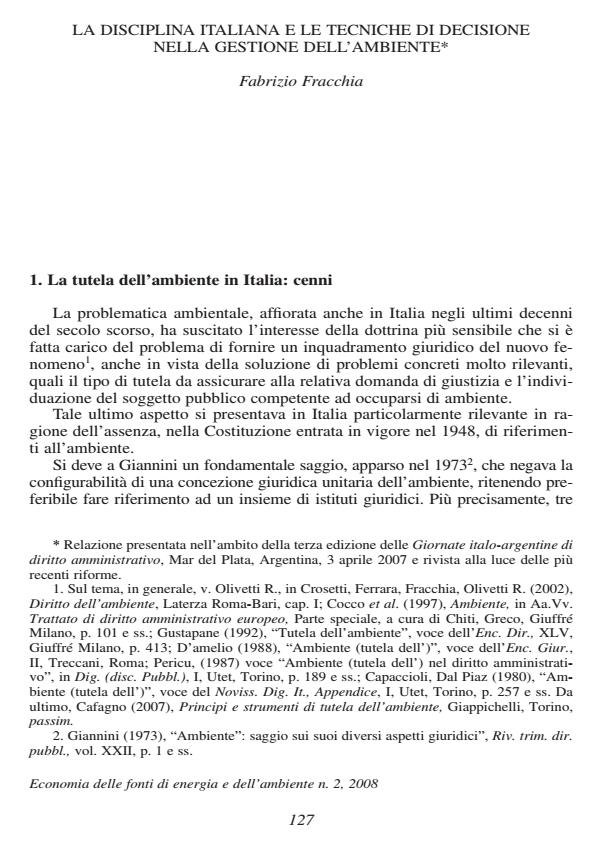La disciplina italiana e le tecniche di decisione nella gestione dell'ambiente
Titolo Rivista ECONOMIA DELLE FONTI DI ENERGIA E DELL’AMBIENTE
Autori/Curatori Fabrizio Fracchia
Anno di pubblicazione 2009 Fascicolo 2008/2
Lingua Italiano Numero pagine 21 P. 127-147 Dimensione file 600 KB
DOI 10.3280/EFE2008-002009
Il DOI è il codice a barre della proprietà intellettuale: per saperne di più
clicca qui
Qui sotto puoi vedere in anteprima la prima pagina di questo articolo.
Se questo articolo ti interessa, lo puoi acquistare (e scaricare in formato pdf) seguendo le facili indicazioni per acquistare il download credit. Acquista Download Credits per scaricare questo Articolo in formato PDF

FrancoAngeli è membro della Publishers International Linking Association, Inc (PILA), associazione indipendente e non profit per facilitare (attraverso i servizi tecnologici implementati da CrossRef.org) l’accesso degli studiosi ai contenuti digitali nelle pubblicazioni professionali e scientifiche.
Managing Environmental Interests: Decision Patterns within the Italian Legal System - The article deals with the main patterns established by the Italian legal system with respect to the decisions regarding environmental issues. After outlining the most important theories related to the problem of the juridical definition of the environment, as well as the constitutional context, which assigns the environmental protection to the competence of the State, the analysis singles out five different models. The first one is the result of the application of the environmental principles established by the European sources and enforced by the Italian Law; in this regard, in particular, the precautionary principle interferes with the usual way through which the Public Entities take their final decisions. The second pattern embodies the idea according to which the environment is a prominent value, capable of prevailing over other values and interests. The third one, starting from the same assertion (the environmental interest must "win"), adds that it must only be assessed by technical bodies with a specific competence. The fourth model is based upon the premise that the environmental proceedings cannot be simplified, so that some legal tools such as "conferenza di servizi", silence and so on, cannot be applied in this field. The last pattern considers the possibility for Bodies different from the State (such as the Regions) to regulate the environmental issues, thus introducing stricter levels of protection of the environment. The article underlines that the size of this competence strictly depends on the notion of "protection of the environment" that is used (in any case, the Constitutional Court, since the fundamental decision n. 407 of 26th July 2002, considering the environment as a sort of transversal matter, has ruled that important room for regional legislative power does exist). Very often there is a sort of subsidiarity, since in the first place the technical bodies have the competence to take care of the environmental interest, while the bureaucracy or the politicians can intervene only afterwards and in case of inertia or conflict. The main thesis suggested by the article is that the most appropriate body entitled to take the final decision in the environmental field should be the political one. Emphasizing the principle of integration, the article assumes that the environment is an interest that must be taken into account by the decision makers, but adds that it must be balanced with other interests, in a perspective of relativism: it is a specific task of the political system to guarantee a final synthesis among different values. The article also underlines the relevance of the sustainable development principle, aimed at guaranteeing that the satisfaction of the current generation doesn’t affect the quality of life and the chances of the future generations. The sustainable development is the true root of the whole environmental law buildings and basis of the other environmental principles, within the Italian context (Legislative Decree n. 152/2006). It seems to have left behind the limits, disciplinary also, of the environmental law, being now a general principle of the administrative activity tout court. It shows that the environmental decisions might usually affect the interests of the future generation, hence confirming that those choices must be made by the politicians, since they represent the whole community.
Key words: Environment, decision patterns, sustainable development.
JEL classifications: K32
Fabrizio Fracchia, La disciplina italiana e le tecniche di decisione nella gestione dell'ambiente in "ECONOMIA DELLE FONTI DI ENERGIA E DELL’AMBIENTE" 2/2008, pp 127-147, DOI: 10.3280/EFE2008-002009